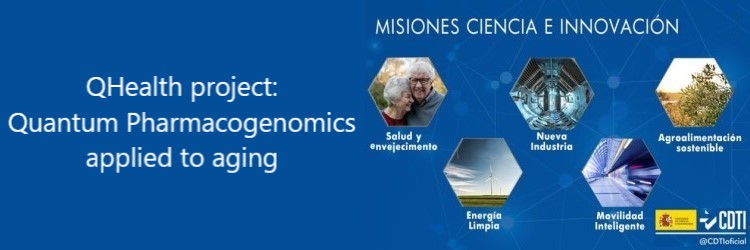The first year of the QHealth project: Quantum Pharmacogenomics applied to aging has concluded and we have proceeded to formally close the intense work carried out during this period.
The exhaustive review of the state of the art of the pharmacogenetic variables involved in the adverse effects of drugs on older people has made it possible to provide the necessary knowledge and to design the first version of the data model that will serve as the basis for the following tasks.
Although at the beginning of the project the technical team had no doubts about it, with the results of the research carried out in the 2020 annuity it has been reliably verified that the only way to be able to treat such a large set of personal, genomic and drug variables (together with their interactions), is by quantum computing. Based on this premise, after analyzing the state of the art of quantum technologies from different providers, annealing technology has been selected because it is closely aligned with the objectives of the QHealth project.
Another important result is that the need for research on methods and techniques to assure quality quantum software has been confirmed. This is an essential element when it comes to quantum computing providing a sustainable response to aging diseases and needs.
In this annuity, QuantumPath (QPath) was also chosen as the project’s general-purpose quantum platform. After a detailed comparative study of the most relevant quantum platforms, it was concluded that QPath provides the necessary modules to give adequate support to a health research project of this scope, especially for:
- providing the ideal scaling to make the executions of the experiments feasible in the optimal way possible (both in simulators and computers)
- efficiently supporting the two quantum technological approaches (gate-based and annealing)
- facilitating, by architecture, the integration of quantum services with classical health systems
- supporting high-level transformations appropriate for specific QHealth resolutions. QPath also ensures the reusability of applied knowledge on annealing technology, thanks to its agnostic capacity and support of gate-based quantum computers.
The extensive bibliographic review, together with the experience in the cardiology sector, has allowed us to obtain a list of characteristic and important variables as a particular case study of the investigation.
Also, progress has been made in the evaluation of the storage of variables and the creation of tools adapted to the needs of the project, for which it is essential to comply with the requirements and needs of health experts.
The results of this first year not only show full compliance with the established work plan , but also contain progress and decisive results for the fulfillment of the mission related to the project: Provide a sustainable response to diseases and derived needs of aging.
The positive progress of the QHealth project is possible thanks to the scientific and technological collaboration of the multidisciplinary teams of researchers and technologists of the Consortium made up of aQuantum (by AlhambraIT), Gloin and Madrija and of the Knowledge-generating Centers: INUBE, University of Castilla La Mancha (UCLM) and the University of Extremadura (UEx).
The project “QHealth: Quantum Pharmacogenomics applied to aging” has a total budget of € 5,160,477.00 and has received a grant from the CDTI (Center for Industrial Technological Development of Spain) of € 3,671,281.69. The project has been supported by the Spanish Ministry of Science and Innovation and by the ERDF (European Regional Development Fund).


Recent Comments